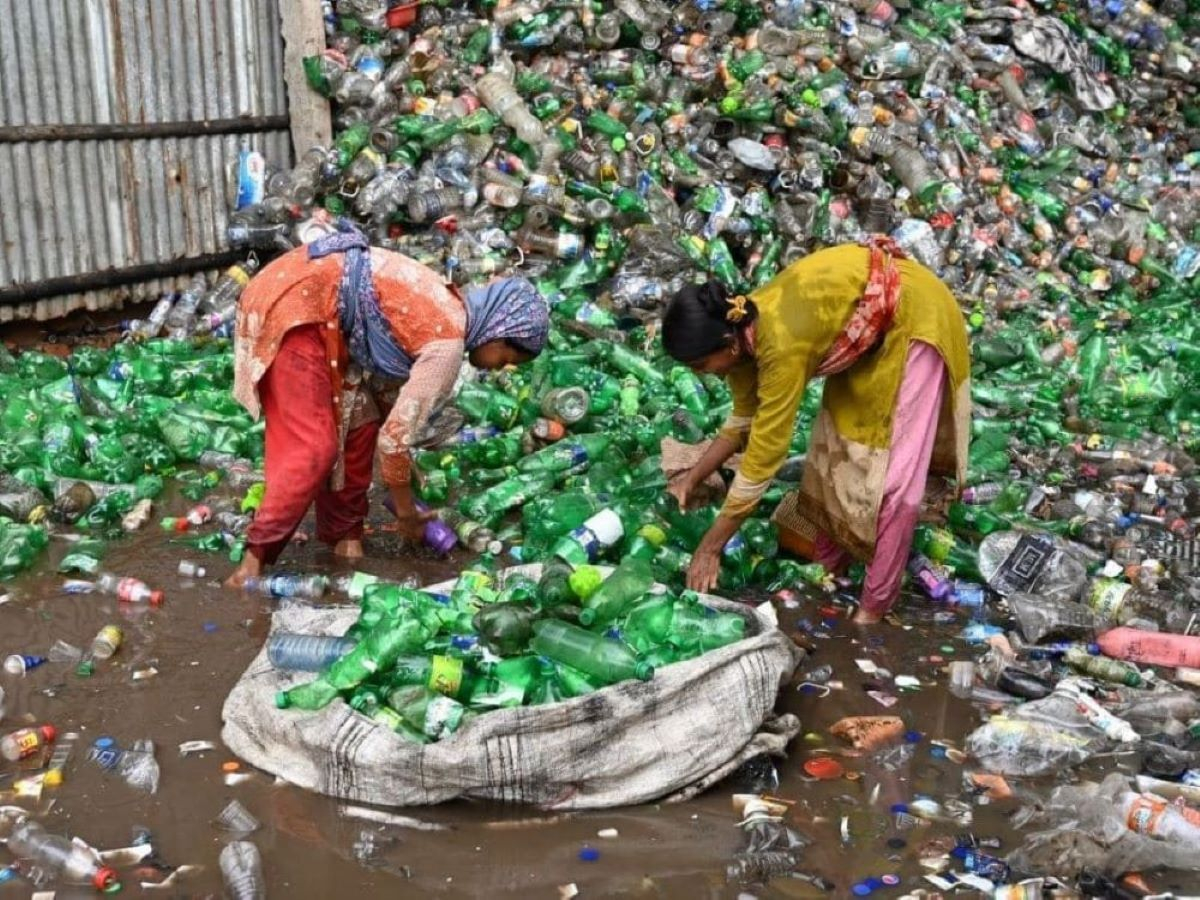This article is available also in Italian / Questo articolo è disponibile anche in italiano
The fifth and final round of negotiations (INC-5) for a Global Plastics Treaty begins today, November 25, 2024, in Busan, South Korea, and is scheduled to wrap up on December 1. Two and a half years after the historic agreement of March 2, 2022 with which the fifth United Nations Environment Assembly (UNEA-5.2) requested the Executive Director of the United Nations Environment Program (UNEP) to call for the Intergovernmental Negotiation Committee (INC) in order to develop a legally binding instrument that addresses the entire life cycle of plastics by 2024. Points of disagreement between countries, however, continue to outnumber the points of convergence and the remaining seven days of negotiations appear to be insufficient to reach an effective agreement.
At stake is whether environmental objectives and the protection of human health will prevail – through an agreement addressing the proliferation of plastic at all stages, from production to disposal, as supported by the High Ambition Coalition To End Plastic Pollution – or would be instead the economic interests of petrochemical industries and plastic-producing countries (self-described as the Like-minded Countries). These countries oppose a treaty that includes ambitious goals that would limit or reduce primary plastic production and would like, instead, to reduce the scope of the agreement to waste management. In the middle between the two groups lie the United States, which announced their support for a cap on plastic production in June 2024, but backtracked after the recent US elections.
The Like-minded Countries – led by Saudi Arabia, Iran and Russia – have implemented tactics to derail negotiations in all previous rounds of negotiations (INC-1 in Punta del Este; INC-2 in Paris; INC-3 in Nairobi; INC-4 in Ottawa). In fact, we arrived at INC-5 with an official negotiation text (the so-called Revised Zero Draft) which cannot be used for negotiations due to its excessive length and incomprehensibility, along with an informal document proposed by the president of the INC, Ambassador Luis Vayas Valdivieso of Ecuador, in which no option regarding obligations to reduce primary plastic production is present.
The 67 countries of the High Ambition Coalition reaffirmed their resolve to conclude an agreement by the end of 2024 in a joint ministerial statement ahead of INC-5, as did the leaders of the world's major economies in the G20 Leaders' Declaration of Rio de Janeiro. Observers doubt, however, that concluding any agreement that lacks enough ambition could be counterproductive.
The danger of a start & strengthen approach
“As the final plastics treaty negotiations approach, there’s a momentum to set global goals”, said Hélionor de Anzizu, senior attorney at the Center for International Environmental Law (CIEL). “However, without binding national obligations, the treaty risks becoming a 'Paris-style' agreement. Relying solely on broad targets may lead to fragmented action, business challenges, and friction across markets and is likely to delay meaningful impact: time is a luxury we simply don’t have.”
In fact, recently, there's been talk of taking a start & strengthen approach, but according to CIEL there’s a risk it could lead to problems: this approach often sets global objectives but postpones the actions necessary to achieve them to the future, without any guarantee that these strengthening actions would actually take place. As an example of the failure of this approach, CIEL cites the UN Framework Convention on Climate Change and the Paris Agreement. Countries left to act on their own accord have created a substantial gap between the aim of the agreement (limiting global warming to within 2° C, and ideally within 1.5°C) and national action (Nationally Determined Contributions NDCs which have proven insufficient): this means that global temperatures are projected to rise by 2.5°C - 3.7 °C within 2100.
“Once the text of a treaty has been agreed – warns CIEL – the decisions of the Conference of the Parties (COP) do not have the power to create obligations beyond the text of the treaty.” In fact “the COP’s decisions that can create new obligations are either amendments to the text of the treaty or a new protocol, both of which require ratification by the parties to come into force. They often take years, if not decades.”
Would a “coalition of the willing” outside the UNEP negotiating process be better?
“Many countries are determined to achieve a truly ambitious treaty, which means that it must include a cap on plastic production”, said Neil Tangri, Science and Policy Director at the Global Alliance for Incinerator Alternatives (GAIA), to Renewable Matter. “If the spoiler countries were to frustrate that effort here at INC-5, it could cause a collapse in the negotiations. Another possibility would be to ditch UNEP entirely, forcing countries that want to solve the problem to negotiate with those who are trying to derail their efforts directly. Negotiations among a ‘coalition of the willing’ would be faster, more productive, and ultimately more effective.”
Key elements of an effective treaty
“An effective plastics treaty requires implementation of policies throughout the entire life cycle of plastics”, Tara Olsen, Researcher in the section of Production, Markets, and Policy at the University of Copenhagen and a member of the Scientists’ Coalition for an Effective Plastics Treaty, explained to Renewable Matter. “This obviously includes the implementation of upstream measures to reduce primary plastics production (PPP). This is especially important given the fact that, according to OECD production, use and generated waste are projected to increase by 70% by 2040 compared to 2020. Acknowledging the scientific challenges in quantifying a fixed, long-term PPP target, such as the potential underestimation of true environmental and socioeconomic costs, we stress the importance for the target to remain scientifically informed and adaptive over time to align with the latest scientific understanding.”
Olsen is one of the almost 1.000 independent scientists that signed the Scientists' Declaration for the Global Plastics Treaty, of which the updated version for INC-5 was released on November 23. The document calls on INC members to agree on an ambitious global plastics treaty based on scientific evidence to end plastic pollution by 2040.
According to Andrés del Castillo, Senior Attorney at CIEL, and Lindsey Jurca Durland, Campaign Specialist at CIEL, in addition to a cap on plastic production with mandatory national targets, the essential elements for an effective plastics treaty include: a ban on toxic chemicals of concern, trade measures that address non-Parties, governance mechanisms that avoid consensus, and innovative financial mechanisms. The two experts warn that during the negotiations vigilance over delay tactics will be required, along with attention paid to industry influence (the number of lobbyists present at INC-3 was greater than that of G7 delegates, at INC-4 than that of EU delegates and 87 countries combined), to the danger to compromise the ambition of the treaty for the sake of timing, as well as the influence of the newly elected US president on the treaty.
Whether it would be better to adopt an ambitious treaty with a critical mass of “willing states” rather than accepting a weak treaty due to the need to reach a consensus (in practice whether it is better to follow the model of the Paris Agreement or that of a specific convention such as the Minamata Convention) has been a question since the beginning of the negotiations. As analyzed by the WWF, “in the long run it is usually easier to increase participation than to change the text of a treaty”.
Through the use of consensus and the right of veto, in the Climate COPs and in the Paris Agreement, interests linked to the fossil fuel economy have blocked actions to contain global warming. These interests prevailed once again at COP29 that ended yesterday, Sunday 24 November, in Baku, Azerbaijan. 99% of plastic is produced from fossil fuels and the same states that have blocked climate action have worked from the beginning to block the development of an effective treaty against plastic pollution. It remains to be seen what moves the “coalition of the willing” will undertake during INC-5.
Image: Mumtahina Tanni, Pexels



